- Home
- Joel C. Rosenberg
The Twelfth Imam Page 15
The Twelfth Imam Read online
Page 15
Iran Telecom, Zalinsky had explained, had recently awarded a huge contract to Nokia Siemens Networks, requiring all manner of NSN engineers and other experts to enter Iran, make specific telecommunications upgrades, and train their Iranian counterparts. NSN, in turn, had contracted Munich Digital Systems to build much of the necessary infrastructure. Since the CIA already had agents, including David, embedded within MDS, this had created—virtually overnight—the opportunity to put boots on the ground, to place Farsi-speaking Agency operatives inside Iran Telecom, the mother ship of the modernization effort.
Zalinsky had shown David a story in the Wall Street Journal reporting that the Iranian regime was seeking, with NSN’s and MDS’s help, to develop “one of the world’s most sophisticated mechanisms for controlling and censoring the Internet, allowing it to examine the content of individual online communications on a massive scale.” This effort went far beyond blocking access to Web sites or severing Internet connections, enabling authorities not only to block communication but to gather—and sometimes alter—information about individuals.
David recalled another intriguing headline from the business section of the New York Times: “Revolutionary Guard Buys Majority Stake in Iran Telecom.” That story, he knew, had eventually made it into the president’s daily intelligence briefing. David’s heart still raced as he recalled the text of the article in his mind’s eye and considered its implications in light of the NSN/MDS deal.
The transaction essentially brought Iran’s telecommunications sector under the elite military force’s control. The article explained that the purchase would allow the Guard in times of crisis to “interrupt mobile phone networks” and “hinder the opposition’s organization.”
The last paragraph of the story intrigued David most. It noted that the IRGC was essentially “free from any state oversight” and was “accountable only to the Supreme Leader, who has the final say on all state matters in Iran.”
If the Times story was accurate, then Zalinsky was right. If the CIA could penetrate the inner circle running Iran Telecom, perhaps they really did have a shot at penetrating the inner circle running the Revolutionary Guard. Whether that trail could lead David into the Supreme Leader’s office, getting him hanged or shot in the face, was a question mark at best. But as David watched the snow sticking to his windshield, he imagined the prospect of actually being able to intercept the most private phone calls of Iran’s Supreme Leader and the calls of his closest staff and advisors. What if Langley could actually read the e-mail and text messages of Iran’s highest leaders? What if they could follow messages coming to and from computers and phones inside Iran’s clandestine nuclear facilities? The very notion made him want to get into Iran now. He could hardly wait. They had to move fast, before the Israelis struck.
Suddenly there was a knock on his passenger-side window. It was his father, standing there in the freezing cold in his pajamas, holding the Saturday morning edition of the Post-Standard newspaper in his hand and staring at him in disbelief.
“David? Is that you?”
33
Hamadan, Iran
Najjar Malik awoke to the sound of his baby daughter crying.
He groaned, rolled over, and whispered to his wife, “It’s okay, princess. I’ll get her and bring her to you.”
But as he opened his eyes and tried to rub the sleep out of them, Najjar realized that Sheyda was not beside him. He glanced at the alarm clock. It was only 4:39 a.m. He still had nearly an hour before he had to be up for morning prayers. Still, he slipped out of bed and went looking for the love of his life, only to find her nursing their baby daughter.
“You okay?” he asked through a yawn.
“Yes,” Sheyda replied, smiling at him with a warmth and genuineness of which he never tired. “Go back to bed. You need your rest.”
Najjar smiled back. He could have ten more children with her, he decided, even if they were all girls.
Suddenly there was heavy knocking on the door of their high-rise flat.
“Who could that be at this hour?” an annoyed Najjar said.
To his astonishment, two Revolutionary Guard soldiers brandishing machine guns were standing in the hallway.
“What is the meaning of this?” he demanded in a whisper, trying not to wake the entire floor.
“The director says you must come immediately,” said the larger of the two, apparently a colonel.
“Dr. Saddaji sent you?” Najjar asked. “Why didn’t he just call?” The man was, after all, not just the director of Iran’s atomic energy agency but his father-in-law.
“I don’t know,” the colonel said. “He just said it was urgent.”
“Fine, I’ll be there in an hour.”
“I’m sorry, sir. The director told us to take you with us. We have a car waiting downstairs.”
Najjar turned to Sheyda, who had covered herself with a blanket.
“Go,” she said. “You know Father would never send for you if it wasn’t important.”
She was right, and Najjar loved her all the more for her support. He closed the door, leaving the soldiers in the hallway. Then he threw on some clothes, brushed his teeth, splashed some water on his face, grabbed his briefcase, and ran out the door, stopping only to give Sheyda a kiss.
On the drive, they passed dozens of mosques, and Najjar felt a strong need to pray. He had no idea what the day held. But he had never been summoned so early in the morning, and his anxiety over what was coming grew minute by minute.
As sunrise approached, Najjar finally heard the call to the Fajr, or dawn prayer, coming from the speakers of one of the many minarets adorning the skyline of Hamadan. As had become a ritual five times a day since he was a small child back in Iraq, he dutifully faced Mecca, raised his hands to his ears, and recited the Shahada—the testimony of faith—declaring he bore witness that there was no one worthy of worship except Allah and he believed with all his heart that Muhammad was the servant and messenger of Allah. Then he placed one hand to his chest and his other hand on top of the first and prayed, “In the name of Allah, the Most Gracious, the Most Merciful. Praise be to Allah, Lord of the Worlds. The Most Gracious. The Most Merciful. The Master of the Day of Judgment. You alone do we worship. You alone do we ask for help. Show us the straight path, the path of those whom you have favored, not of those who earn your anger nor of those who stray. Amen.”
As he continued reciting portions of the Qur’an, bowing toward Mecca as best he could from the backseat and continuing his morning prayers, Najjar found his anxieties multiplying, not dissipating. He desperately wanted to hear from Allah, to see him, to behold his beauty and come fully into his presence. He wanted Allah to grant him favor and wisdom and a calm reassurance that he was doing Allah’s will and pleasing him in every way. But he felt no peace. He felt no joy. When he finished, he felt further away from Allah than when he had begun.
An hour later, Najjar stood in the middle of a cavernous, empty warehouse. The concrete floor was cold and wet, as if it had been recently hosed down. Sitting several yards away was a man bound to a chair, his hands and feet shackled in iron chains. The man’s mouth was gagged, but he was not blindfolded, and Najjar could see the terror in his eyes. It was clear he had been beaten severely. His face was bruised and swollen, and blood trickled down his cheeks.
Najjar thought there was something vaguely familiar about him. “Who is he?”
“You were never supposed to meet him,” Dr. Saddaji replied not only to Najjar but to the two dozen other scientists standing around them. “But events beyond our control have forced the issue.”
Najjar watched his father-in-law staring at the man, who was silently pleading for his life. But there was nothing in Dr. Saddaji’s voice or body language that suggested mercy would be forthcoming. Indeed, Najjar had never seen him so cold, so dark, so filled with hatred.
“Gentlemen, take note of this man and remember him well,” Dr. Saddaji said. “He is an Arab—an Iraqi—and a traitor
.”
Najjar was stunned. It was one thing to be from Iraq. He was, and so was Dr. Saddaji, along with several others. But they weren’t Arabs. They were all Persians.
How can there be an Arab in our midst? Who allowed it, and why?
This research facility was top secret, buried deep inside Alvand Mountain, the highest peak in the region. Of the half-million people in the surrounding area, including in Hamadan—one of the oldest cities in Iran—not a single one was Arab. Less than one-tenth of one percent of them knew this facility existed at all, much less that the future of Iran’s civilian nuclear power program was being designed and developed here. What on earth could have possessed someone to allow an enemy into the camp?
As if on cue, Dr. Saddaji took the responsibility upon himself.
“Gentlemen, I will be candid. I recruited this man. He was once a colleague at the University of Baghdad, one of the most brilliant minds of our generation, an absolute genius in the field of UD3. He was not one of us, true. But we needed his expertise. I thought I could trust him. With the blessing of the Supreme Leader, I made him an offer he couldn’t refuse. But I made a mistake. He sold us out. Now he must pay.”
Saddaji’s response generated more questions than it answered, at least for Najjar. UD3? Why in the world would Saddaji need an expert in the use of uranium deuteride? Even a junior physicist like himself knew UD3 had no civilian uses. Had Dr. Saddaji completely lost his mind? What if the IAEA caught wind of a UD3 expert—one from Iraq, at that—inside a nuclear facility the IAEA didn’t even know existed? Why take such a risk with the eyes of the international community riveted so intently on the Iranian nuclear program?
Before Najjar could raise any of these questions, however, Dr. Saddaji continued, outlining what this man had done to betray them all. He explained that the man had been caught making two unauthorized calls to Europe.
“He claims he has a girlfriend in France,” Dr. Saddaji sniffed. “He claims he had no idea his girlfriend was an agent for the Mossad.”
Najjar couldn’t believe what he was hearing. He had never met a man as careful, as thorough, as meticulous about everything—and especially about security—as his father-in-law. Whoever this person sitting before them was, his treachery was appalling. But what did his father-in-law expect? Couldn’t he have seen this coming? Something didn’t make sense.
But this “trial”—if it could be called that—was suddenly over as quickly as it had begun. No one was being invited to ask questions of the accused or of Saddaji. An executioner now entered the warehouse, carrying an ornate sword that looked several centuries old. His face was covered by a black ski mask. A moment later, the traitor’s head was rolling across the warehouse floor. Najjar became violently ill, but the point had been made—all betrayals, real or imagined, would be punished severely.
34
Syracuse, New York
The weekend was bittersweet.
It began Saturday morning with a breakfast of pancakes and lies. David couldn’t tell his parents the truth about why he was in the country. Instead, he told them he had suffered through a series of mind-numbingly dull business meetings in Chicago. Then he lied about where he was heading next, telling them he was flying to Frankfurt, then driving to Wiesbaden for more meetings. He lied about whether he would be home for Mother’s Day, saying, “Absolutely,” then silently cursed himself for the rest of the day. He had no way of knowing where he would be or what he would be doing in three months. It wasn’t fair to lead his parents on. But he didn’t know what else to do, and he felt terrible.
Deception was central to his life in the CIA. But that didn’t make it any easier, and a brooding conscience, growing anxiety about the mission ahead, and a serious lack of sleep after driving all night from Washington proved a depressing cocktail. David tried to catch a few hours of sleep in his old room after breakfast but kept tossing and turning. Finally he gave up and joined his father for an afternoon of cross-country skiing across the back nine of the golf course at Drumlins Country Club.
That night, over dinner with his parents at their favorite Italian place on Erie Boulevard, David asked about his brothers. He was just trying to be polite, but the very question made his mother wince.
Azad, his father explained, was thriving as a cardiologist in Philadelphia, and yes, the rumors were true: he and his wife were expecting their first child. But no, they never visited; no, they never called; no, they hardly ever e-mailed. Once the baby was born, the Shirazis planned to drive down and visit Azad and his wife, but they honestly weren’t sure how long they’d be welcome.
Saeed, meanwhile, showed no signs of settling down. He was dating a dancer—or was it a cellist? At any rate, he was dating someone new—always someone new—in Manhattan. He still seemed to be married to his job with Merrill Lynch and was convinced he was well on his way to making his first million. But no, he hadn’t been home in ages, and no, he hadn’t gone fishing with his father in years. Not long before, the Shirazis had visited Saeed for a long weekend, but Saeed spent most of the weekend in the office and had made little time for his parents, who had returned to Syracuse brokenhearted.
After dinner, David tried to shift gears. Talking about family wasn’t doing them any good, so he suggested they rent one of the Lord of the Rings films and watch it together. His mother had never seen it and insisted on making popcorn, pulling out some afghans, and having her husband make a fire in the fireplace. They all got comfortable in the family room to watch The Return of the King, but within the first few minutes, David’s mother fell asleep. Within half an hour, so did his father. David didn’t bother to watch the rest, though it was one of his favorite films. Instead, he turned off the TV, went up to his room, and surfed the Web for the latest headlines from Iran and the Middle East.
Several caught his eye.
Israeli PM Naphtali at Dachau Says World Must Stop Iran, or He Will
Israeli Defense Minister Says Someone Must Hit Iran’s Nuclear Sites “Before It’s Too Late”
President Jackson Warns Against Israeli Strike on Iran’s Nuclear Facilities
U.N. Security Council Considers New Round of Iran Sanctions
Iranian President Darazi Warns Israel “Doomed” If Zionists Attack
David’s stomach churned along with his thoughts. Exhausted, he eventually went to bed but couldn’t sleep. Around four in the morning, he got an e-mail from Eva, whose subject line read, “You up?” He eagerly opened it, hoping it might be personal. It wasn’t.
EF: Something’s afoot in Yemen
She was right, of course. He recalled the phone call DDO Murray had taken in his office. But why did it matter at 4 a.m.? Eva included a link to a recent Agence France-Presse story she had found on the Internet. David opened it and quickly scanned the article.
“Before the Twelfth Imam appears on earth to establish his global kingdom, we will see a series of signs,” said Dr. Alireza Birjandi, author of The Imams of History and the Coming of the Messiah, at a conference Friday in Qom sponsored by the Bright Future Institute. “The first sign is the rise of a fighter from Yemen called the Yamani. He will attack the enemies of Islam, and in so doing he will help pave the way for the end of days.”
Birjandi, widely considered the world’s leading expert on Shia eschatology, declined to comment on whether the recent attacks against Christians in Yemen represented the fulfillment of that sign. But other scholars gathered for this three-day conference speculated that this could, in fact, be the case.
The Bright Future Institute is a theological think tank established in the city of Qom in 2004 by Shia scholars to study Mahdism in depth and to prepare Shias for the return of the Islamic messiah, known as the Mahdi or the Hidden Imam or the Twelfth Imam.
Puzzled, David sent a text message to Eva’s phone.
DS: don’t know what 2 make of that
A moment later, Eva wrote back.
EF: i don’t know either
DS: ever hear of birjandi?
DS: me neither . . . on amazon now . . . ordering his book
EF: good idea . . . i’ll look into the bright future institute
DS: thnx—let’s compare notes on mon . . . how R U? where R U?
EF: i’m good . . . thnx 4 asking . . . hanging out w/ my parents and sisters in berlin . . . how about U? surfing in cancun? sunbathing in san juan?
David smiled as he replied.
DS: lol—i wish. actually visiting my folks in syracuse . . . but can’t wait 2 get started
EF: me 2. . . see you soon—looking fwd 2 it . . . how about *$ in DXB?
It took a moment for David’s sleep-deprived brain to decipher that last one, until he realized she was suggesting they go to Starbucks when they got to Dubai. He typed a final message.
DS: Yes—SYS—OAO
See you soon. Over and out.
He plugged his phone back into its charger and finished ordering Dr. Birjandi’s book online, directing it to be shipped to his apartment in Munich. Then he shut down his laptop, lay back down in the darkness, and stared out the window at the moonlight falling on the snow-covered backyard.
So, Eva wasn’t with a boyfriend for the weekend. Interesting. It didn’t mean she didn’t have one, of course. But if she did, she hadn’t chosen to spend the weekend with him. She was with her family, instead. And thinking of him. He liked that, and in the privacy of his childhood bedroom, he admitted—if only to himself—that he found Eva a little more than just interesting, against his better judgment.

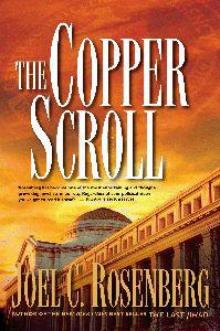 The Copper Scroll
The Copper Scroll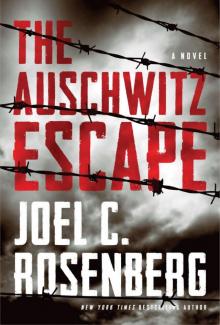 The Auschwitz Escape
The Auschwitz Escape The Last Jihad
The Last Jihad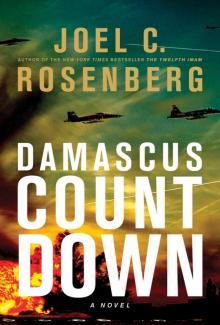 Damascus Countdown
Damascus Countdown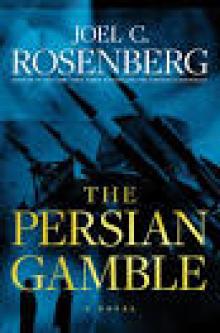 The Persian Gamble
The Persian Gamble The Jerusalem Assassin
The Jerusalem Assassin Dead Heat
Dead Heat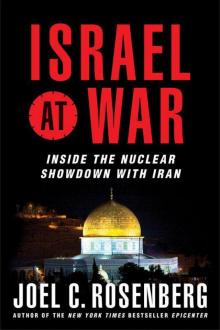 Israel at War: Inside the Nuclear Showdown With Iran
Israel at War: Inside the Nuclear Showdown With Iran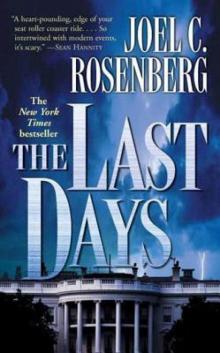 The Last Days
The Last Days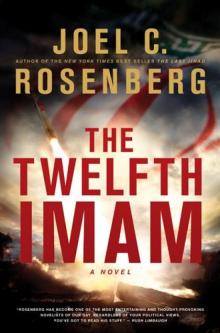 The Twelfth Imam
The Twelfth Imam Epicenter 2.0
Epicenter 2.0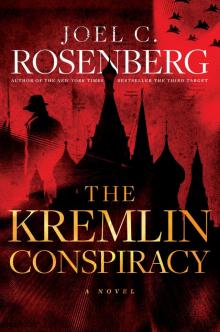 The Kremlin Conspiracy
The Kremlin Conspiracy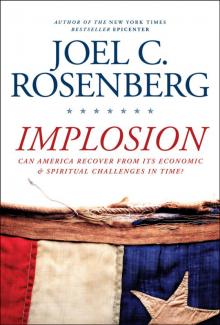 Implosion: Can America Recover From Its Economic and Spiritual Challenges in Time?
Implosion: Can America Recover From Its Economic and Spiritual Challenges in Time?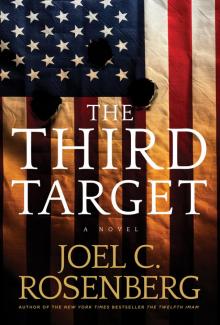 The Third Target: A J. B. Collins Novel
The Third Target: A J. B. Collins Novel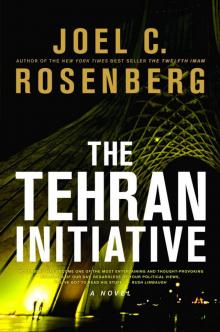 The Tehran Initiative
The Tehran Initiative Inside the Revolution
Inside the Revolution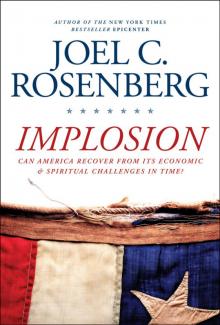 Implosion
Implosion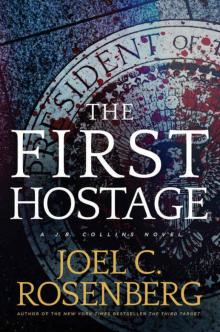 The First Hostage: A J. B. Collins Novel
The First Hostage: A J. B. Collins Novel